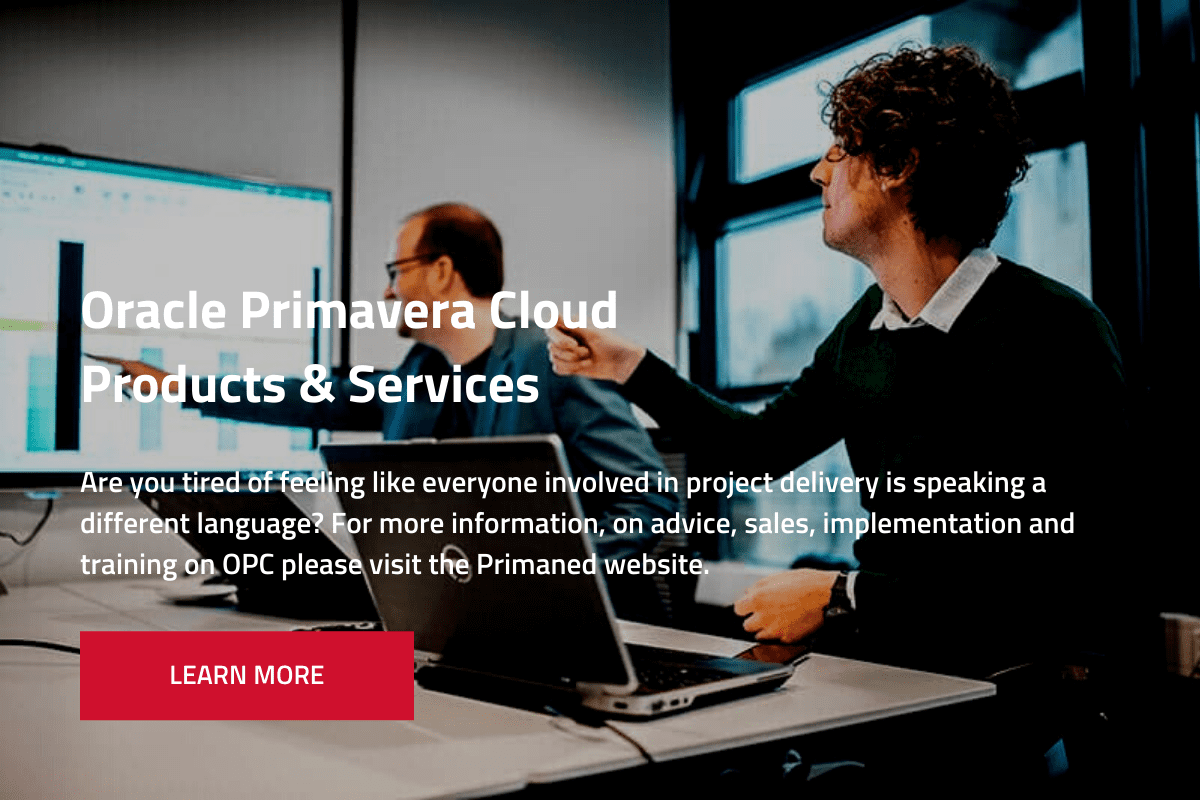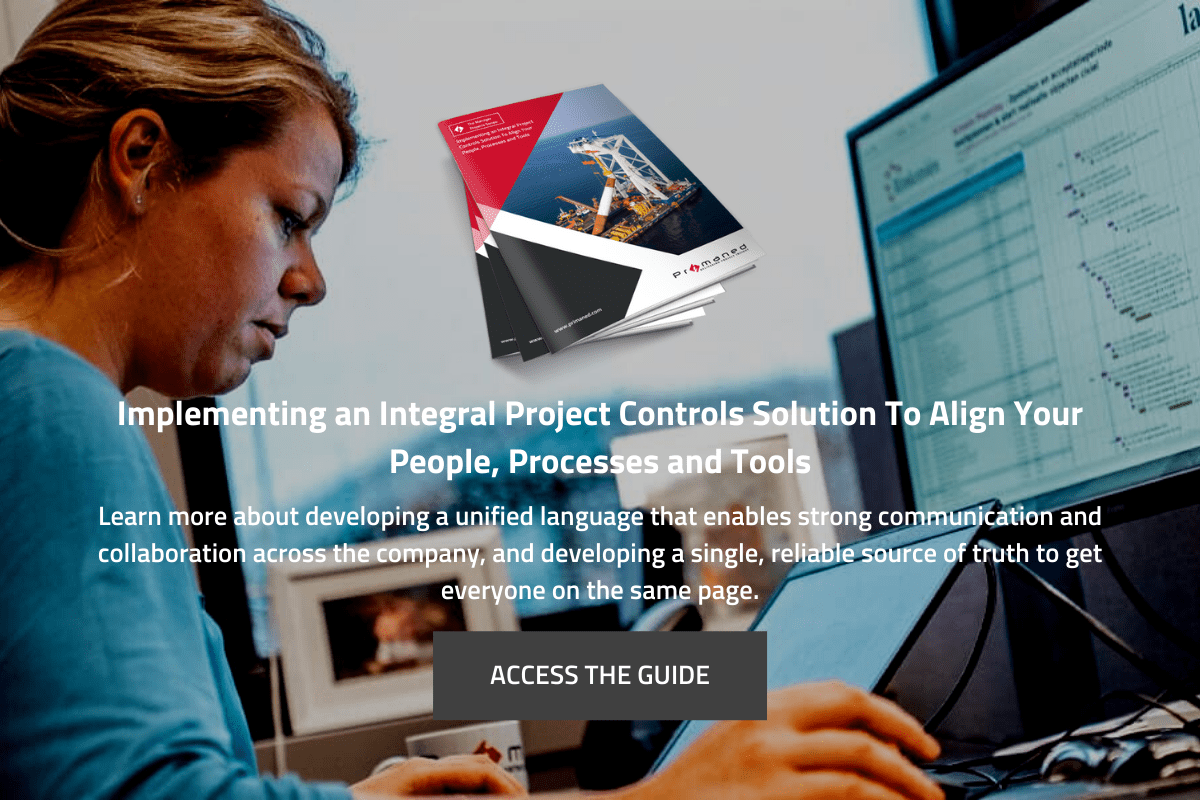Answered: The Top 7 Questions We Regularly Get Asked About Oracle Primavera Cloud
By Paul Vogels on Jan 13, 2022 11:00:00 AM

Answered: The Top 7 Questions We Regularly Get Asked About Oracle Primavera Cloud
When presenting a business case for Oracle Primavera Cloud to the board, you’ll likely be met with a number of questions. These are questions that your c-suite will need answering before they can make a decision on whether an Oracle Primavera Cloud implementation is the right choice for them, and for cross-departmental workers.
Of course, the questions that each board will ask will vary depending on a huge variety of factors, from business objectives to individual c-suite interests and pain points.
However, there are a few standard questions that we at Primaned get asked regularly by organisations looking to implement project controls into their way of working, and who are considering Oracle Primavera Cloud. Below, we’re going to share these questions with you - along with our expert answers - to help you develop a strong business case that answers everything your c-suite panel wants and needs to know.
1. Can Oracle Primavera Cloud really handle all of our requirements?
One of the first questions we’re usually asked is “we operate in the X industry, can OPC software work for us?” The answer is typically “yes”. As a very flexible project controls tool, Oracle Primavera Cloud offers a comprehensive set of features, functions, and modules to support effective project management across a broad range of specialist fields.
Oracle Primavera Cloud can bring value to construction, energy, industry, infrastructure, air traffic, maritime, offshore, petrochemistry, pharmaceutical, and public sector businesses, with everything you need to succeed all within a single platform.
2. How does Oracle Primavera Cloud create less risk in scheduling and planning?
While Oracle Primavera Cloud is a single SaaS platform, it includes multiple modules that cover scope management, planning management, cost management, resource management, risk management, and document collaboration, so it is a full end-to-end tool that brings together various project stakeholders - and their data - into one system, reducing project risk.
Ultimately, what this does is improve all-round project visibility, and that’s key to reducing risk in both scheduling and planning. With a single version of the truth, and access to real time data, the most common risks of planning can be easily mitigated.
3. What are the risks of continuing without Oracle Primavera Cloud?
While the risks of using older, manual planning and scheduling methods will vary for each individual business, what we do know from working closely with our clients is that, prior to implementing Oracle Primavera Cloud, many were having to reject projects, not because they couldn’t take them on, but because they didn’t have the confidence to.
This resulted in them losing out on potentially great opportunities simply because they weren’t sure they could deliver with excellence. Planning today needs to be as tight as possible to create new opportunities, and that’s not easy without project controls.
4. Can we prove the ROI of a project controls system like Oracle Primavera Cloud?
This is one of the trickiest questions. The c-suite will want solid data; they’ll want to see that investing in Oracle Primavera Cloud is worth it from a financial perspective; that it generates more than it costs, for example by helping planners to reduce project cost. However, proving ROI prior to OPC implementation is tricky. OPC’s ROI comes from project results, which won’t be seen until later in the process.
It can sometimes feel as though you’re stuck. Initially, it can help to share case studies from Oracle itself. For example, one Primavera Cloud client, AMP United, reduced time to develop new schedules by 95%. Approximate time to value is a few months.

5. What level of investment is needed to purchase Oracle Primavera Cloud?
Oracle Primavera Cloud is offered as a ‘software as a service’ solution, which means Oracle maintains the software in the cloud, and the software is simply ‘rented’ rather than owned and installed on your own servers. This means that investment is much lower than for traditional software applications and owned tools such as Primavera P6.
The level of investment needed to implement Oracle Primavera Cloud is low. The SaaS model means upfront costs are low as there is no need for additional hardware, and there are predictable ongoing costs for managing and updating the software. Furthermore different investment or licence models are available. These include user based or a low single project or programme percentage. There is also a complete enterprise project value option, meaning your Primavera investment can progressively grow with your revenue stream.
6. How long does Oracle Primavera Cloud implementation take?
The time needed to implement Oracle Primavera Cloud depends on whether you install in-house, or work with an implementation partner. It is typically quicker - and less risky - to work with an experienced partner that is knowledgeable about implementing project controls software, and who can work internally or remotely based on needs.

7. How can we be sure we’re choosing the right implementation partner?
The truth is that there really aren’t all that many specialist implementation partners specialising in Oracle Primavera Cloud, so it’s very tempting to simply choose the first one you find. The problem with this is that some don’t always fully understand your requirements, and if they get it wrong, it could end up reflecting badly on you.
We always advise our clients to conduct their own requirement analysis, ask questions of different consultancies, and present options to the board that operate in alignment with your needs, deliver what you need, when you need it, and fall within your budget.
Look for a partner with a long track record in OPC and other supporting solutions in the Project Controls Tolling landscape, offering end-to-end support rather than a standard IT provider tied into the software vendor.
- OPC (15)
- Software (12)
- PC Boardroom (11)
- Academy (9)
- Consultancy (7)
- Manager Project Controls (6)
- IT / Procurement (5)
- Planning Engineer / Scheduler (5)
- Project/Assets Manager (4)
- Information Manager (3)
- BI & Data Analytics (2)
- C-level (2)
- Document Controller (2)
- Document Management (2)
- Oracle Aconex (2)
- Project Controls (2)
- Risk Manager (2)
- Scheduling Lead (2)
- Operational project staff (1)
- PMWeb (1)
- Resource Manager (1)
- Safran Risk (1)
Subscribe by email
You May Also Like
These Related Stories

The Manager Projects Series: How to Build an Oracle Primavera Cloud Implementation Business Case Your C-Suite Will Love
How to Build an Integral Project Controls Solution with Oracle Primavera Cloud Business Case Your C-Suite Will Love Before digging into Oracle Primavera Cloud, …

Planning Principles: How to Increase Your Team’s and Organisations’ Understanding for Better Project Success With OPC
Planning Principles: How to Increase Your Team’s and Organisations’ Understanding for Better Project Success With OPC There’s a very common misconception amongs …

Developing an OPC Project Management Strategy: 5 Essential Things You Need to Know
Developing an OPC Project Management Strategy: 5 Essential Things You Need to Know A growing number of organisations across multiple industries are seeking bett …



